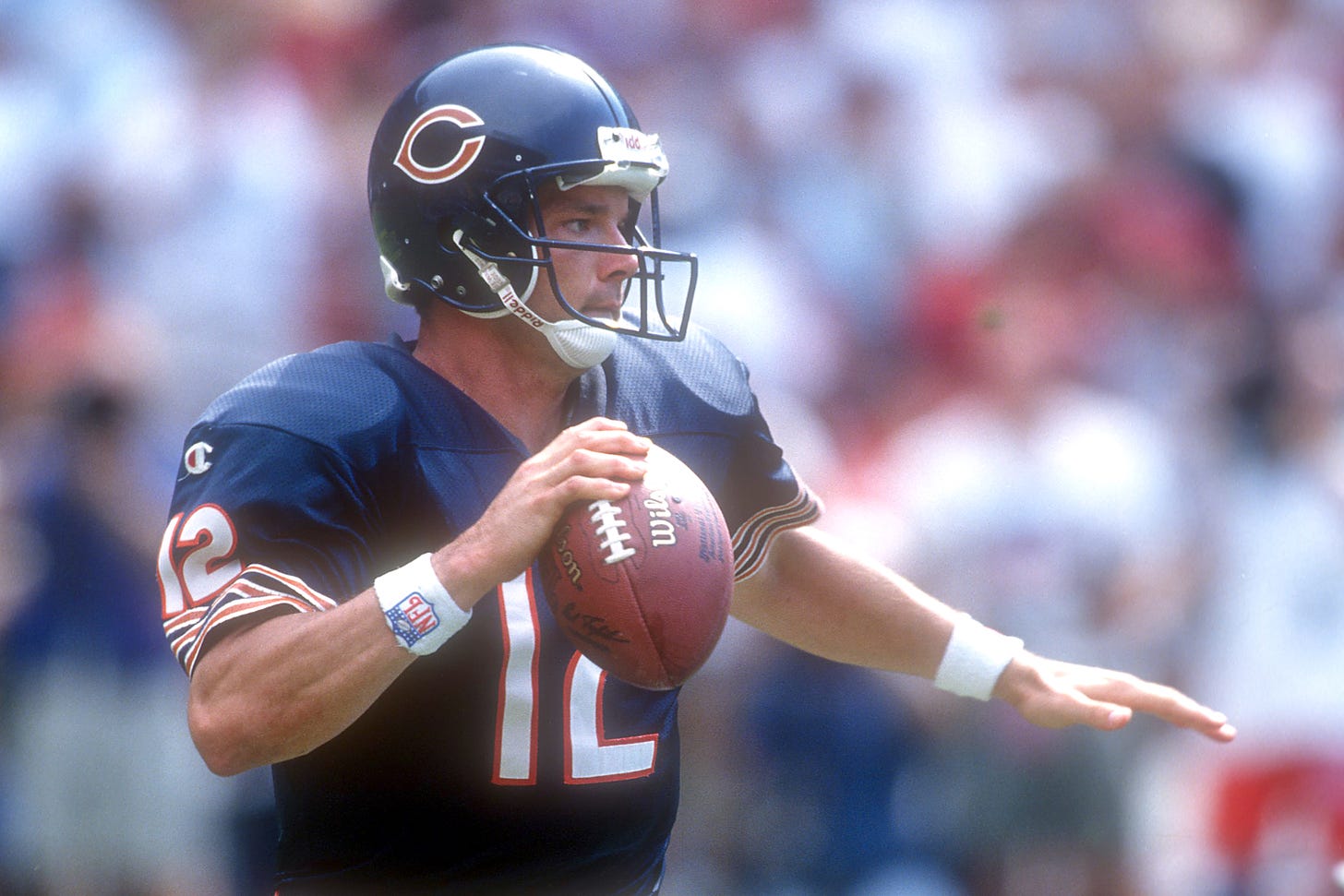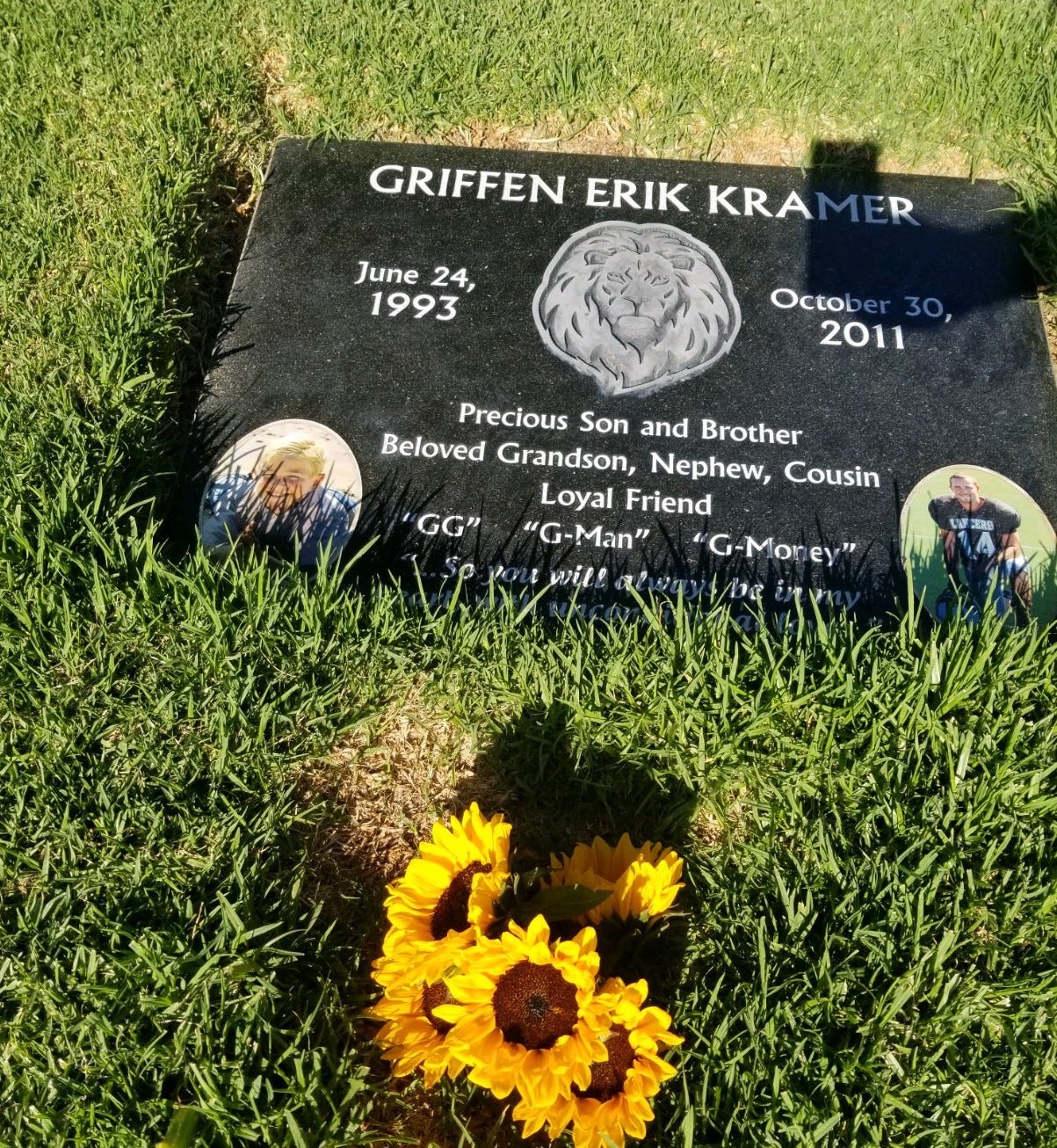The Fight for Erik Kramer’s Life, Part I: A miracle
His life unraveled in every way imaginable. You won't believe what this former quarterback has been through. But guess what? He's still standing. Kramer shares his surreal story with Go Long.
First, he was depressed. After a series of tragic events, Erik Kramer decided to take his own life. He pulled that trigger… miraculously survived… and things only got wilder. When we first launched this Go Long newsletter, months ago, Kramer was one of the first players to get right back to us. He badly wanted to share what’s happened since his 10-year career wrapped up and… wow.
What Kramer has been through is almost impossible to fathom.
What hurt the most was that Erik Kramer wasn’t sure if his son knew exactly how much he loved him.
That kind of pain sticks with you as a parent. Forever.
Still, the former NFL quarterback will never forget feeling an overwhelming rush of hope for Griffen that Friday night in 2011. He drove his son back from a high school football game and, for the first time, Griffen started talking about his own future. He sounded excited about his future. He was even smiling. A quarterback at Thousand Oaks (Calif.) High School, Griffen even asked his Dad if he could talk to his former JUCO coach on his behalf about going there. One of his teachers at school had apparently told him there were JUCOs out there that catered to kids with learning disabilities.
This jolt of optimism was no simple feat.
Never before had father and son chatted like this. Not with Griffen battling addiction at this tender moment in his life — he was just in rehab. It was around this time that Griffen had also started to distance himself from Dad, who had just separated from Mom. The two boys, Griffen and Dillon, were shuttling between homes three or four days at a time with Griffen eventually choosing to stay just with his mother, Marshawn.
Yet in this moment? Here in Kramer’s car? Everything was so perfect.
They talked this night for a solid hour.
“He was believing in himself, really, for the first time and thinking about going to school,” Kramer says. “Griffen started to come around to, ‘Hey, there’s a bigger world out there.’”
Two mornings later, Kramer received a phone call.
It was the police. Griffen had died from a heroin overdose. He was 18.
No, Kramer isn’t sure if he truly knew how much he loved him.
“And that,” Kramer says, “is when the whole world changed.”
The surreal fight for Erik Kramer’s life begins here, with tragedy, 11 years after his NFL career wrapped up.
That death expedited a spiral into depression. Kramer started to truly believe the best years of his life were behind him.
Oh, playing in the NFL was fun. Kramer supplied fans plenty of thrills on the field. The Encino, Calif., native smashed the odds as an undrafted longshot who bounced around from the Saints to the Falcons to the CFL’s Calgary Stampeders before getting a shot to quarterback the Detroit Lions. He did not disappoint. Kramer led the cursed franchise to its only playoff win since 1957 and that team in ’91 was one win away from reaching the Super Bowl. He earned a contract with the Chicago Bears where his 1995 season remains the best statistical season for any QB in team history. Both his 3,838 passing yards and 29 touchdowns that season are still team records.
But now? None of that mattered. It was difficult to find any sense of purpose.
His broadcasting career came, went. He was done coaching his boys. His marriage was headed to divorce. And, now, Griffen was gone. This was the first dead body Kramer had seen in his entire life. He’ll never forget that sight. He’ll also never, ever forget delivering the horrific news to his living son. The 13-year-old Dillon was “destroyed.”
Bad only turned to worse, too.
After becoming closer than ever to his mother, he lost her as well.
The two were never that tight growing up. Kramer frankly didn’t believe his mother even liked him that much. Yet after finding out she had Stage 4 uterine cancer, something changed. She survived life-threatening surgery, started chemotherapy with Kramer right there at her side for every treatment, every hospital stay, every heart-wrenching conversation, and it was like the two were making up for years of lost time.
Mom died in July 2012. Then, Dad became terminally ill. His untreated acid reflex led to esophageal cancer that’d eventually take his life, too.
Kramer did the math in his head and couldn’t find a reason to live.
Granted, Kramer had suffered bouts of depression before. He could always tell when the darkness was about to consume him. (“When it’s coming, it’s coming,” he says. “And you can’t stop it.”) Yet years past, he could always manage it with antidepressants. But this felt different, felt more severe and, no, 10 years of concussions in the NFL surely did not help. Back in the 90s, quarterbacks were still human piñatas. So in 2012, Kramer called a close friend of his who also happened to play quarterback for the Lions: Eric Hipple.
Hipple lost his own son to suicide and had battled his own demons for years. He tried to take his own life in 1999.
At a wellness facility, just outside Ann Arbor, Mich., Hipple had started a program called “After the Impact” to assist former military personnel and retired players dealing with various forms of PTSD.
Kramer flew east and lasted all of one day. Maybe two. He didn’t believe this place was for him.
When the depression only got worse, and worse, and felt more like an “empty sadness” than anything Kramer battled before, Kramer returned for a full 30-day stay. “Thirty excruciating days,” he clarifies. Unfortunately, this didn’t help. Kramer was beyond rehabilitation. Heck, he doesn’t even remember who picked up him in Michigan or how he returned to California that July, only that the next two weeks back home were a haze.
The sadness was getting worse.
The dark cloud over his head refused to subside. Not for one second.
Kramer only saw one solution — to kill himself.
It’s hard for him to even recognize the person he was then. But there was Kramer, at his computer, researching handguns. A man who never owned a gun before was now Googling how to commit suicide. He even went to target practice to feel what it’s like to pull a trigger. Kramer got his living trust in order for Dillon. This raised a red flag to the lawyer he hired, who did express concern to Kramer’s sister. And since Kramer knew that the one thing he did not want was Dillon finding him in a pool of his own blood, he decided to book a night at a Calabasas motel called the “Good Night Inn” five miles from home.
It was Aug. 18, 2015.
He enjoyed a last meal. He entered his room. He wrote a suicide note that started with, “I love you with all my heart. It’s just that my brain won’t allow me to get through the day.”
He says he then became very… “uneasy.”
“Like, “Now, there’s nothing left to do but… it,” Kramer recalls. “And I don’t know. I guess you go into another place to make this happen.”
But, still, why?
Typically, people do not live to explain such a decision so why did it get to this point? When he had another son? Kramer contemplates that question and shakes his head. It’s hard for him to even comprehend who he was in that moment. He cared enough about Dillon to set up a trust and check into this motel, but it never occurred to him that exiting his son’s life could damage him for life. The best way Kramer can answer the Why? is that he was not thinking clearly.
When he was this depressed, there wasn’t much thinking at all.
“There is no worse feeling in the world,” Kramer says. “And that feeling never goes away. It doesn’t take a break. That shadow is cast every second of every day. So, there’s no perspective on any of this. I can’t really say it was an actual conscious decision. There was a time when I wanted to talk about it as though it was not an accident and something I planned out very specifically. But that would be saying that my mind was right at the time also. Which, nobody in their right mind would choose to put a gun under their chin, and then pull the trigger.”
He doesn’t remember doing it but that is precisely what Kramer did.
As that “uneasy” feeling reached its apex, Kramer told a handful of people what he was about to do, including his sister and a high school friend who was now a Los Angeles detective.
His sister frantically called Hipple whose phone was off at that moment. He was at a movie.
That detective wasn’t in L.A. then, instead in the Dallas area visiting his son. He also didn’t see the message in time. But once he got it, he instantly called the sheriff’s department to send help and then called Kramer.
By then, the trigger had been pulled. The bullet traveled up through Kramer’s tongue, his sinuses and then out the top of his forehead.
Miraculously, he survived. Miraculously, he even answered the phone. He couldn’t speak but when his friend heard breathing on the other line, he told Kramer that there were people outside of his door who’d help.
“And apparently,” Kramer says, “I got up and opened a door. And then, apparently, I walked down and got in the ambulance. Again, I have no recollection of this. When I got to the ER, I guess I was sitting up and talking to one of the nurses or something. With a hole in my head. Two, actually.
“All I can say, is it’s a great thing I’m a bad shot. Because I can’t tell you how grateful and lucky I feel to still be here. I don’t know what to say.”
Kramer survived. Doctors saved his life by removing a piece of his forehead.
He spent six weeks in a medically induced coma and seven months in hospitals. Eventually, Kramer landed at the Centre for Neuro Skills (CNS) 30 minutes from his home where people in a “traumatized state,” he says, are able to stay on-site around the clock for brain treatment. At the time, Kramer had not yet undergone cranial surgery to put his skull back together. It was a grisly sight. Via Zoom, Kramer shifts his hands around his head to explain how his head went “from here to here.” Doctors also needed to sew his tongue back together.
At CNS, Kramer wore a helmet 24/7 because one fall could’ve been devastating. He lost complete control of his bladder. Everything was an utter… fog. Kramer wouldn’t even have memories for a good year. Plainly, Kramer says he “wasn’t really working right” for a while.
His only explanation for this all? It’s a miracle.
He was alive. He was given a second chance at life, upon returning home.
And it was right around then that a woman named Cortney Baird re-entered his life.
Little did Erik Kramer know that the fight for his life was only beginning.
To read Part II, CLICK HERE.
(Note: Anyone struggling with suicidal thoughts should call the nation’s suicide prevention hotline at 1-800-273-8255.)





